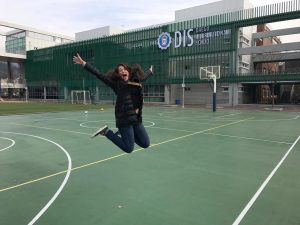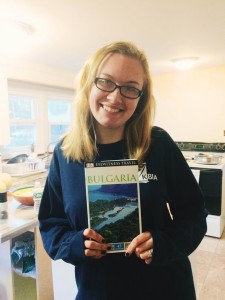As some of you may remember from our post a couple of months back, there are two UMF alumna, Hannah Some and Hannah Carlson, who are teaching English at the university level in Le Mans, France! After having been there for a couple of months, Hannah and Hannah have begun to adjust and have shared some information about their experiences thus far with us.
Both women report not experiencing much of a culture shock when moving to France. Hannah Somes describes it as “such a Westernized country that it really does not feel very different to me in my daily life  than the U.S.” Hannah Carlson had already studied abroad in Le Mans during her undergraduate career at UMF, so she was already somewhat familiar with life in Le Mans and in France. There were some tasks that they had to complete when they first arrived, such as setting up a bank account, which was difficult with the language barriers.
than the U.S.” Hannah Carlson had already studied abroad in Le Mans during her undergraduate career at UMF, so she was already somewhat familiar with life in Le Mans and in France. There were some tasks that they had to complete when they first arrived, such as setting up a bank account, which was difficult with the language barriers.
The classes that Hannah and Hannah are leading are discussion based, designed to help students improve on their English language skills. The classes are very open and broad, allowing the instructor to tailor the lessons towards student interests. “My courses are very speaking intensive; the students are really engaging in holding conversation and using their oral language” said Hannah Somes. Hannah S. indicates that her classes are large (55 to 65 students) making it difficult to have each student speak. She says, “…in these classes I have students talk in a group about a topic and the group presents on a topic of their choosing.” In Hannah S.’s smaller classes she has students do individual presentations and whole-group discussions.
Hannah and Hannah both have very long, busy schedules throughout the day. Hannah Somes teaches for a couple of hours in the morning and afternoon, taking a lunch break at home in between classes as meals are very important in France. Sometimes, she teaches evening courses as well. Hannah Carlson also has a busy schedule, as she is teaching 17 groups of French students this semester. “I have between 10 to 20 students in each class, so there are a lot of students to remember,” Hannah Carlson explains. “I meet with each group once a week. The course title is expression orale, which means it’s a speaking class. The students vary in level, from L1-L3. French universities only have three years of undergraduate study. So far, I have covered topics such as censorship in the United States and pop culture.”
There are some noticeable differences between French and American universities. Hannah Carlson discussed differences in the structure of classes. For example, if a student at a French university changes major, they have to start all over again and the previous classes completed/credits earned do not count towards the new major. They also have longer days at French universities, students are in class from 8 or 9 AM to 5 or 6 PM. “French students are also less willing to raise their hand in class and share answers or their opinion,” said Hannah C. “Classes aren’t set up for class discussion and are instead often lectures where students take notes and occasionally share answers. In my classes, it is sometimes difficult to get students to share answers and their opinion.” This has been a challenge for Hannah, but she has been working around it. “Some of the students have a lower English proficiency and have trouble understanding me. There is also a stigma towards French students sharing the wrong answer here. I’ve been trying to make my students feel comfortable in the class, which would help them be more willing to talk.” Hannah says that her classes at UMF helped to prepare her for her role as a lectrice by having many opportunities to be in front of a classroom.
While they have been busy teaching, they have also been able to find some time to enjoy all that France and Le Mans has to offer! Hannah Somes’ favorite memory so far was a British themed festival that occurred in September throughout the city featuring a Beatles cover band!
Moving across the world to teach in a new place can be overwhelming, but it is definitely rewarding. When asked what advice she had for those interested in moving abroad, Hannah Somes said “French institutions give less direct, step-by-step directions than in the U.S., so it is necessary to be self-directed and autonomous.” Hannah Carlson discusses the challenge that the language barrier presents when interacting in the community. “One of the biggest difficulties of living in France is the language barrier,” she said. “My language proficiency is slowly improving, but it can be hard at times. When I first arrived, I had to set up a bank account by myself with someone who didn’t speak English.” Language barriers can be challenging, and it is important to be aware of these changes and differences before making such a move, but they can be planned for.
All of us here at UMF are happy to hear that Hannah and Hannah have adjusted and are enjoying their new lives in France. Stay up to date with the ED360 blog to receive more updates about their positions and to learn more about the various opportunities that UMF provides both pre- and post-graduation.

 The University of Maine at Farmington currently has four teacher candidates conducting their student teaching at the Daegu International School in Daegu, South Korea. The Daegu International School (DIS) has a partnership with UMF that allows students to conduct their student teaching internationally while meeting all of the requirements to receive their degree. Tori Lands and Kayla Girardin were able to share their experience and discuss various challenges, opportunities, and stores from their experience.
The University of Maine at Farmington currently has four teacher candidates conducting their student teaching at the Daegu International School in Daegu, South Korea. The Daegu International School (DIS) has a partnership with UMF that allows students to conduct their student teaching internationally while meeting all of the requirements to receive their degree. Tori Lands and Kayla Girardin were able to share their experience and discuss various challenges, opportunities, and stores from their experience.
 e most interesting. Maine is not as diverse as DIS, as Tori has students in her classroom from Korea, America, China, the Philippines, Japan, Australia- just to name a few. The diversity in her classroom has allowed her to learn from her students as well. “Instead of just reading about different cultures and countries these students can share personal stories and experiences,” Tori said. “It has been challenging to make sure I am sharing content in a way that makes sense to all the different learners in my classroom and making U.S. history relevant to students who may have only been to the states once or twice is interesting.” Both Tori and Kayla believe the cultural experience that students gain when teaching abroad has been much richer than teaching at home in the states.
e most interesting. Maine is not as diverse as DIS, as Tori has students in her classroom from Korea, America, China, the Philippines, Japan, Australia- just to name a few. The diversity in her classroom has allowed her to learn from her students as well. “Instead of just reading about different cultures and countries these students can share personal stories and experiences,” Tori said. “It has been challenging to make sure I am sharing content in a way that makes sense to all the different learners in my classroom and making U.S. history relevant to students who may have only been to the states once or twice is interesting.” Both Tori and Kayla believe the cultural experience that students gain when teaching abroad has been much richer than teaching at home in the states.

